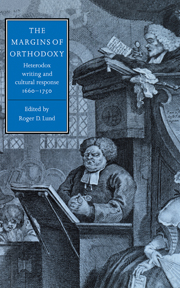Book contents
- Frontmatter
- Contents
- List of contributors
- Acknowledgments
- Introduction
- PART I THE IDEOLOGY AND ORIGINS OF HETERODOXY
- PART II LOCKE AND HETERODOX OPINION
- PART III POLICING THE MARGINS
- PART IV ORTHODOX DEFENSES, HETERODOX RESULTS
- 9 Deists and Anglicans: the ancient wisdom and the idea of progress
- 10 Henry Fielding and the problem of deism
- Select bibliography
- Index
10 - Henry Fielding and the problem of deism
Published online by Cambridge University Press: 09 October 2009
- Frontmatter
- Contents
- List of contributors
- Acknowledgments
- Introduction
- PART I THE IDEOLOGY AND ORIGINS OF HETERODOXY
- PART II LOCKE AND HETERODOX OPINION
- PART III POLICING THE MARGINS
- PART IV ORTHODOX DEFENSES, HETERODOX RESULTS
- 9 Deists and Anglicans: the ancient wisdom and the idea of progress
- 10 Henry Fielding and the problem of deism
- Select bibliography
- Index
Summary
It was deism that taught us to accept the pain of historicity. By granting God powers of initiation and then putting him to sleep forever, deism freed the mind from the puzzle of origins and cleared the way for historical consciousness. Without such a tacit premise, the novel could not have gotten very far, since it really has no room for a will superior to natural law.
These words are by Irving Howe in an essay called “History and the Novel.” Deism is not a phenomenon that is ordinarily related to the origins of the novel. This is because it has usually been taken to mean ethical deism, one consequence of the view that God created the world and, having set it going, abandoned it. In Fielding's own words in The Champion, without an immanent God “then Mankind might be left to pursue their Desires, their Appetites, their Lusts, in a full Swing and without Control.” Owen Apshinken in The Welsh [Grub-Street] Opera (1731) is an ethical deist. His argument for seduction is that “Nature never prompts us to a real crime. It is the imposition of a priest, not nature's voice, which bars us from a pleasure allowed to every beast but man.” But in Fielding's works the emphasis more often falls on the priest, who masks nature with his doctrine.
The association of Fielding with ethical deism is based on his supposed identification in Joseph Andrews with Mr. Wilson and his freethinking club.
- Type
- Chapter
- Information
- The Margins of OrthodoxyHeterodox Writing and Cultural Response, 1660–1750, pp. 240 - 270Publisher: Cambridge University PressPrint publication year: 1995

